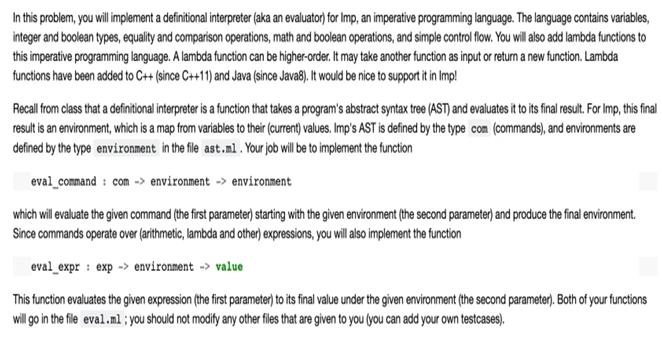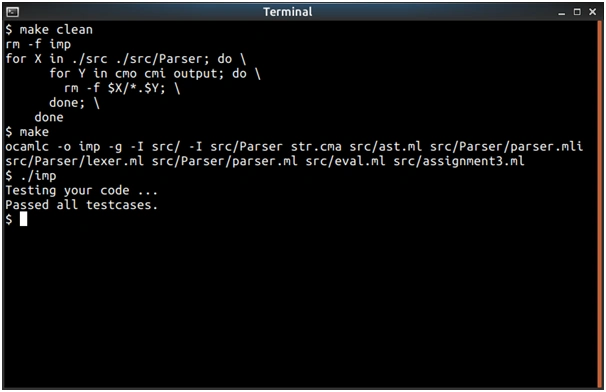Tip of the day
News
Instructions
Objective
Write a program to add lambda functions to interpreters in Ocaml.
Requirements and Specifications

Screenshots of output

Source Code
open Astexception TypeErrorexception UndefinedVarexception DivByZeroError(* Remove shadowed bindings *)let prune_env (env : environment) : environment = let binds = List.sort_uniq compare (List.map (fun (id, _) -> id) env) in List.map (fun e -> (e, List.assoc e env)) binds(* Env print function to stdout *)let print_env_std (env : environment): unit = List.fold_left (fun _ (var, value) -> match value with | Int_Val i -> Printf.printf "- %s => %s\n" var (string_of_int i) | Bool_Val b -> Printf.printf "- %s => %s\n" var (string_of_bool b) | Closure _ -> ()) () (prune_env env)(* Env print function to string *)let print_env_str (env : environment): string = List.fold_left (fun acc (var, value) -> match value with | Int_Val i -> acc ^ (Printf.sprintf "- %s => %s\n" var (string_of_int i)) | Bool_Val b -> acc ^ (Printf.sprintf "- %s => %s\n" var (string_of_bool b)) | Closure _ -> acc ) "" (prune_env env)(***********************)(****** Your Code ******)(***********************)(* evaluate an arithmetic expression in an environment *)let rec eval_expr (e : exp) (env : environment) : value = match e with | Var n -> (match List.assoc_opt n env with | None -> raise UndefinedVar | Some v -> v) | Number n -> Int_Val n | Plus (e1, e2) -> (match (eval_expr e1 env, eval_expr e2 env) with | (Int_Val a, Int_Val b) -> Int_Val (a + b) | _ -> raise TypeError) | Minus (e1, e2) -> (match (eval_expr e1 env, eval_expr e2 env) with | (Int_Val a, Int_Val b) -> Int_Val (a - b) | _ -> raise TypeError) | Times (e1, e2) -> (match (eval_expr e1 env, eval_expr e2 env) with | (Int_Val a, Int_Val b) -> Int_Val (a * b) | _ -> raise TypeError) | Div (e1, e2) -> (match (eval_expr e1 env, eval_expr e2 env) with | (Int_Val a, Int_Val b) -> if b != 0 then Int_Val (a / b) else raise DivByZeroError | _ -> raise TypeError) | Mod (e1, e2) -> (match (eval_expr e1 env, eval_expr e2 env) with | (Int_Val a, Int_Val b) -> if b != 0 then Int_Val (a mod b) else raise DivByZeroError | _ -> raise TypeError) | Eq (e1, e2) -> (match (eval_expr e1 env, eval_expr e2 env) with | (Int_Val a, Int_Val b) -> Bool_Val (a = b) | (Bool_Val a, Bool_Val b) -> Bool_Val (a = b) | _ -> raise TypeError) | Leq (e1, e2) -> (match (eval_expr e1 env, eval_expr e2 env) with | (Int_Val a, Int_Val b) -> Bool_Val (a <= b) | _ -> raise TypeError) | Lt (e1, e2) -> (match (eval_expr e1 env, eval_expr e2 env) with | (Int_Val a, Int_Val b) -> Bool_Val (a < b) | _ -> raise TypeError) | Not e -> (match eval_expr e env with | Bool_Val a -> Bool_Val (not a) | _ -> raise TypeError) | And (e1, e2) -> (match (eval_expr e1 env, eval_expr e2 env) with | (Bool_Val a, Bool_Val b) -> Bool_Val (a && b) | _ -> raise TypeError) | Or (e1, e2) -> (match (eval_expr e1 env, eval_expr e2 env) with | (Bool_Val a, Bool_Val b) -> Bool_Val (a || b) | _ -> raise TypeError) | True -> Bool_Val true | False -> Bool_Val false | App (e1, e2) -> (match eval_expr e1 env with | Closure (env', x, e') -> let v = eval_expr e2 env in eval_expr e' ((x, v)::env') | _ -> raise TypeError) | Fun (x, e) -> Closure (env, x, e)(* evaluate a command in an environment *)let rec eval_command (c : com) (env : environment) : environment = match c with | While (e, c1) -> let rec whilerec guard body env' = (match eval_expr guard env' with | Bool_Val b -> if b then whilerec guard body (eval_command body env') else env' | _ -> raise TypeError) in whilerec e c1 env | For (e, c1) -> let rec forrec n body env' = if n > 0 then forrec (n - 1) body (eval_command body env') else env' in (match eval_expr e env with | Int_Val i -> forrec i c1 env | _ -> raise TypeError) | Cond (e, c1, c2) -> (match eval_expr e env with | Bool_Val b -> if b then eval_command c1 env else eval_command c2 env | _ -> raise TypeError) | Comp (c1, c2) -> eval_command c2 (eval_command c1 env) | Assg (x, e) -> (match List.assoc_opt x env with | None -> raise UndefinedVar | Some v -> (match (v, eval_expr e env) with | (Int_Val _, Int_Val b) -> (x, Int_Val b)::env | (Bool_Val _, Bool_Val b) -> (x, Bool_Val b)::env | (Closure _, Closure (env',y,e')) -> (x, Closure (env',y,e'))::env | _ -> raise TypeError)) | Declare (Int_Type, x) -> (x, Int_Val 0) :: env | Declare (Bool_Type, x) -> (x, Bool_Val false) :: env | Declare (Lambda_Type, x) -> (x, Closure (env, "x", Var "x")) :: env | Skip -> envRelated Samples
Explore our Ocaml Assignments sample section designed to deepen your functional programming skills. Engage with topics like recursion, pattern matching, data structures, and functional programming paradigms. Each assignment offers clear solutions and insights to enhance your understanding and proficiency in Ocaml. Start mastering functional programming with our expertly curated assignments today.
OCaml
Word Count
12229 Words
Writer Name:Dr. Heather M. More
Total Orders:800
Satisfaction rate:
OCaml
Word Count
7510 Words
Writer Name:Priya Nair
Total Orders:841
Satisfaction rate:
OCaml
Word Count
20285 Words
Writer Name:Prof. Benjamin Tan
Total Orders:911
Satisfaction rate:
OCaml
Word Count
1057 Words
Writer Name:Dr. Brian G. Hernandez
Total Orders:600
Satisfaction rate:
OCaml
Word Count
6509 Words
Writer Name:Dr. Kristen R. West
Total Orders:700
Satisfaction rate:
OCaml
Word Count
32909 Words
Writer Name:Dr. Brian G. Hernandez
Total Orders:600
Satisfaction rate:
OCaml
Word Count
4490 Words
Writer Name:Prof. Liam Anderson
Total Orders:944
Satisfaction rate:
OCaml
Word Count
3696 Words
Writer Name:Prof. Benjamin Reynolds
Total Orders:711
Satisfaction rate:
OCaml
Word Count
2987 Words
Writer Name:Prof. William Johnson
Total Orders:748
Satisfaction rate:
OCaml
Word Count
3673 Words
Writer Name:Prof. William Johnson
Total Orders:748
Satisfaction rate: